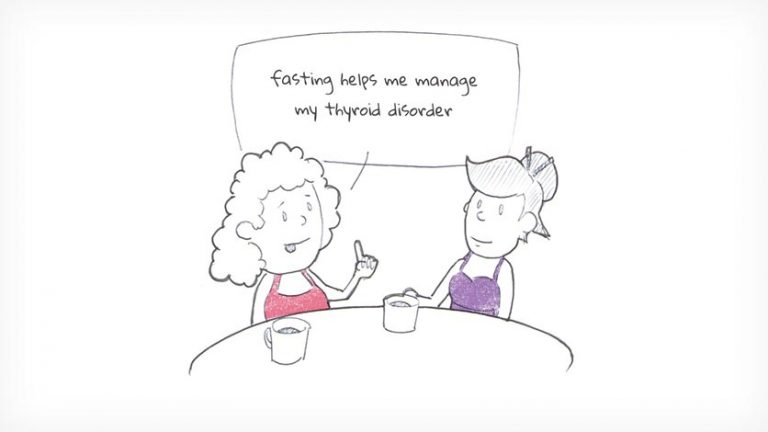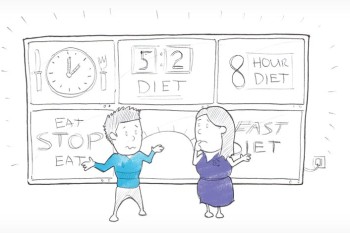Having a thyroid disorder often causes weight problems, as weight goes on easily but is very hard to reduce. This can be frustrating, and also a cause of further health problems. The good news is that many thyroid sufferers in the FastDay community have found that intermittent fasting has been the best way they have found to lose weight.
The thyroid gland is a key player in how much energy your body uses (its metabolic rate).1 An under-active thyroid can lower the amount of energy you burn in a day by a significant amount, while treatment for an over-active thyroid can have the same effect. It is no wonder that weight problems are so common.
Learn more about metabolism and weight loss
Tips on how to use intermittent fasting to best effect with thyroid disorders
Our FastDay community has many people with thyroid problems – whether due to an under-active thyroid, having had their thyroid removed or being on treatment for an over-active thyroid.
Do not fast for too long a period
For people with thyroid problems a slow down in metabolic rate that occurs after some hours of fasting1,2 may be particularly undesirable. To prevent this, do not fast for more than 24 hours without some food, possibly less. More frequent, shorter, fasts are probably the better choice. So you might prefer to use a 4:3 or ADF schedule rather than 5:2 or perhaps a daily eating window approach will suit you best. You might find that 4:3 with a higher calorie allowance (say 1000 calories on a fast day) will be more effective than standard 5:2 on only 500/600 calories although the actual reduction in weekly calorie intake would be around the same. It make take a bit of experimenting for you to find out what works best for you.
Learn more about different ways of fasting
Eat during the hours of daylight
Our bodies have evolved to be active and feed during the daytime and to rest at night time. The production of thyroid hormones is arranged to fit with this natural pattern. When your thyroid is not working as well as it should, keeping your eating times to daylight hours may help it to function most efficiently. Thus, on a fast day, aim to have your meal(s) when it is light outside.
Eat some carbohydrates but not too much
Carbohydrates can stimulate thyroid function but can also worsen weight gain, so a balanced approach is best. Although at FastDay we usually suggest you avoid all carbohydrate on a fast day, if you have a thyroid disorder, you should include some carbohydrate. This does not need to be a large amount, perhaps between 80g and 150g of net carbs. Of course, this would apply to non-fast days as well.
Do not over-exercise
Intense exercise can result in a decrease in thyroid function (presumably the body’s way of trying to compensate for the high energy use during exercise) especially if repeated daily.3 Leave a day between each bout of strenuous exercise to allow your body to recover.
Learn more about exercise and fasting
Get your medications checked regularly as you lose weight
Your thyroid medications need to be adjusted as you lose weight not only because the correct dose depends on your weight but also because losing weight and intermittent fasting itself may affect the way your thyroid functions. Some people with an under-active thyroid have found that their medications could be reduced and so have some people with an over-active thyroid. So it is hard to predict how your body will respond.
More information for the scientifically inclined
How the thyroid and thyroid hormones work
Your thyroid gland, which is situated in the lower front part of your neck, produces hormones that play a role in a variety of functions throughout the body, and impact many other hormones outside the thyroid. The two main states of dysfunction seen in thyroid conditions are called hyperthyroidism (too much hormone) and hypothyroidism (too little).
Thyroid function starts in the brain where the pituitary gland releases a hormone called thyroid stimulating hormone (TSH). TSH stimulates the thyroid to produce its hormones. These are called T4 (thyroxine), T3 (triiodothyronine), T2 and T1. The most important hormones are T4 and T3. T4 is a kind of ‘storage’ hormone, whose main function is to convert to the active thyroid hormone T3. People who have an under-active thyroid or who have had their thyroid removed have to take thyroxine (T4). Without this conversion of T4 to T3, cells have too little T3 to maintain normal metabolism. T3, therefore, is the important thyroid hormone. For the most part, T4 is metabolically inactive.The conversion of T4 to T3 occurs in the tissues where T3 exerts its effects. T3 affects every cell in your body and ensures your body temperature remains stable and your cells are functioning correctly. The situation is complicated by the existence of another molecule termed reverse-T3, which is also made from T4 but reverse-T3 does not stimulate metabolism.
Under normal conditions, the body’s cells continually convert about 40% of T4 to T3 while the remaining 60% of T4 is converted to reverse-T3. Hour-by-hour, conversion of T4 continues with slight shifts in the percentage of T4 converted to T3 and reverse-T3. Usually, the body eliminates reverse-T3 rapidly, so that it has little effect. If levels of reverse-T3 are very high, however, it may be that it can inhibit the effect of T3 but this is uncertain.
Thus the final effect on the metabolism will depend on:
-
How much TSH is produced by the pituitary
-
How much T4 and T3 is produced by the thyroid
-
How much T4 is converted to T3 and how much to reverse-T3 in the tissues.
Thyroid function testing
The first place doctors look to find out whether a person has a thyroid problem is to measure the amount of TSH in the blood: high levels of TSH show that the brain is trying to get the thyroid to produce more hormones and so suggests that the thyroid is not responding as it should. However, if TSH is normal that does not mean that all is well. It could be that you do not have enough T4 or that there is not enough T4 being converted to T3. Thus to get a better picture of thyroid function, it is important to test levels of T4, T3 and, ideally, reverse-T3 as well. However, large amounts of the T4 and T3 produced by the body become bound to proteins in the blood where they cannot exert any effects on metabolism. Thus it is important that the values of ‘free T4’ and ‘free T3’ are tested not ‘total T4’ and ‘total T3’.
If you have an under-active thyroid and are taking thyroxine but continue to have symptoms of an under-active thyroid – tiredness, feeling the cold, weight gain and the inability to lose weight, hair loss, loss of libido etc., it could be that the thyroxine is not being converted to an adequate amount of T3.
A useful website for people with thyroid problems is http://thyroiduk.healthunlocked.com/
Thyroid hormones and fasting
During fasting, disease, or any other stress, the conversion of T4 to reverse-T3 increases. At these times, conversion of T4 to T3 decreases about 50%, and conversion of T4 to reverse-T3 increases about 50% resulting in a slowing of the metabolic rate.
In people with normal thyroid function, studies have found that fasting causes an initial increase in T4 levels followed by a gradual fall in the ratio of T3 to T4 during the first 24 hours of the fast.2 TSH levels fall steadily,1 showing that thyroid function increases at the start of the fast but later decreases. An increase in reverse-T3 to T3 ratio is also seen.1,2 Indeed, any period of calorie restriction causes a slow down in thyroid function.4 When food is re-introduced after a fast, there is a rapid increase in thyroid function even when the amount of food is fairly small.1,5
There have been few studies of fasting in people with thyroid disorders. One found that people with an under-active thyroid tended to respond similarly to those with normal thyroid function.6














